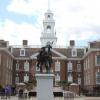In Lewes, music is cause for uproar

A request from the pastor of a Pennsylvania church to use amplified sound in Lewes Canalfront Park has generated a sharp response from residents, and their complaints have prompted city officials to consider regulating events in city parks.
In a March 28, letter, the Rev. David McDowell, music pastor of United Methodist Church in Stewartstown, Pa., asked permission for the church choir, the Company of Praise, to perform in Lewes.
“Our choir consists of 25 singers and 10 instrumentalists,” McDowell wrote, submitting a request to Elaine Pease, city project official, to perform for an hour starting at 6:30 p.m., Saturday, April 27.
“I wish to express that our purpose for singing at the park is not to proselytize but to allow people to hear our music,” McDowell wrote.
To use an amplified sound system as requested, Pease told McDowell, the church must ask for an exemption from Lewes Mayor and City Council.
“We are asking for an exemption to use our sound system knowing that we will fully respect the area and use the system only to be heard, not to create an inappropriate level of sound,” McDowell wrote.
But at mayor and council’s April 8 meeting, Kim Ayvazian, a Pilottown Road resident, said she doesn’t know why the group needed amplified sound.
Ayvazian said she can hear Canalfront Park performances inside her home, and also hears amplified music originating from Irish Eyes that crosses the Lewes-Rehoboth Canal. She said she doesn’t like hearing music from either venue.
“It’s an invasion of our space, our time and our home. We don’t need amplified music,” she told the panel, adding that if the city had an established policy, “That would be fine.”
Mayor Jim Ford said the city does have a noise ordinance, but it’s abstract and difficult to prosecute those who might violate it.
“By allowing them to use amplification you’re giving them free advertisement at the expense of residents,” Ayvazian said.
City Councilman Fred Beaufait said the city sponsors the Summer Concert Series in Stango Park, where musicians typically perform using amplified sound. Beaufait said he has not heard noise complaints from residents who live near Stango Park, an area with greater housing density than Pilottown Road.
Following two motions that failed because there was no second – one to allow the group to perform with amplified sound as requested, and another for a change of venue from Canalfront Park to Stango Park – the panel approved the Canalfront Park performance, 4-1, but did not permit amplified sound.
Councilman Ted Becker cast the no vote, because, he said, of concerns the city “might open a window that we can’t get out of.”
He said he didn’t like the short time the panel had from the date of the request until the event, nor did he like the method the group used to reach a decision.
Pease, in an April 10 interview, said she phoned McDowell to tell him about the city’s decision, and he said the group would not come to Lewes.
She said McDowell told her the choir, which is all children, might need the vocal support an amplified sound system would provide.
Pease said McDowell expressed an understanding of the city’s decision and said he might ask again for an opportunity to perform in Lewes.
Lewes to develop park use regulations
Lewes Mayor and City Council are going to consider policies to regulate events that might seek to use Canalfront or other city parks, concentrating on establishing use policies.
“We’re going to work on it, but we don’t have a timeline for it,” Lewes Mayor Jim Ford said in an April 11 interview.
Ford said he and city council, city parks and recreation officials and Friends of Lewes Canalfront Park members would develop written guidelines and policies for the parks with the community’s interest in mind.
The Stewartstown church request, Ford said, came with short notice from an out-of-state organization with no ties to Lewes that would have used the park free of charge.
He said under those circumstances there was no reason to approve the church’s request.
Ford said the city has a long history of sound and noise complaints.
“Sound ordinances are difficult to write, make understandable and effectively enforce,” he said.
He said the city borrowed a sound pressure meter from Dewey Beach Police Department and used it to measure sound produced by the emergency generator at City Hall.
“We measured standing next to the generator, in the parking lot, and across the street from it, and all the measurements were different,” Ford said.
Glen Mandalas, Lewes city attorney, said noise ordinances based on sound pressure levels, which are measured in decibels, are rarely sustained in court.
Mandalas said another method, called the reasonable person standard, asks: ‘If a reasonable person were standing here, would they consider what they’re hearing to be excessively loud?’
The city’s existing ordinance uses this method, and the reasonable person is typically a police officer, Mandalas said. The ordinance has proven difficult to enforce.

























































